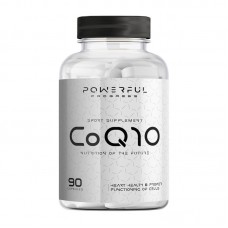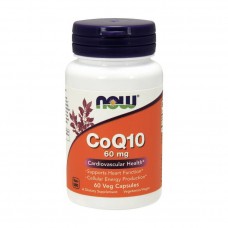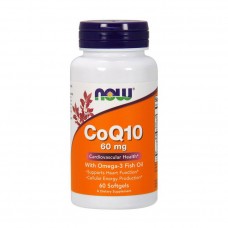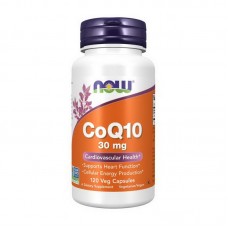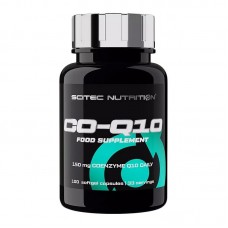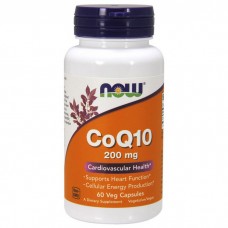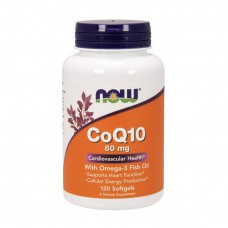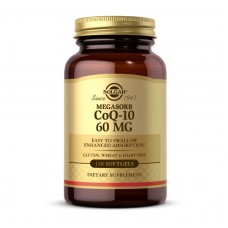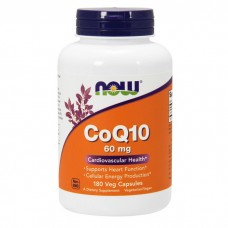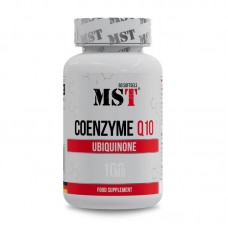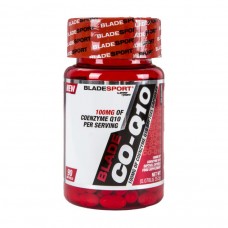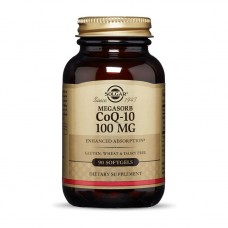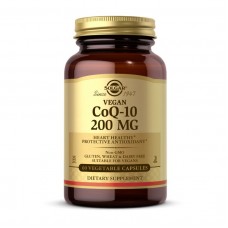Price: 0 uah
CheckoutCoenzyme Q10
Coenzyme Q10 is a powerful antioxidant that supports the proper functioning of the body. Although it is mainly associated with anti-aging supplements, its scope is much wider.

Coenzyme Q10 - what is it?
Coenzyme Q10, also known as ubiquinone, is a chemical compound belonging to the group of cofactors that determine the action of certain enzymes. It is a substance naturally produced by the human body. It is an important component of mitochondria, responsible for energy production and participating in ATP production. Ubiquinone is involved in metabolic changes, more precisely in the Krebs cycle. It consists of phenylalanine and tyrosine, and the compound is produced in the liver. Under the influence of B-group vitamins, the synthesis of coenzyme Q10 is improved.
Ubiquinone is well soluble in fats and alcohols, but not soluble in water. The substance is resistant to UV radiation and temperatures up to 50 degrees Celsius. At higher temperatures, the compound is damaged.
With age, the level of coenzyme Q10 decreases, and the process of decreasing substance content in the body can be observed around the age of 30.
Sources of coenzyme Q10
Are you interested in which natural products contain coenzyme Q10? It is widely available in food products that everyone uses every day. Among the sources of ubiquinone:
- fatty fish (tuna, salmon, mackerel),
- legume seeds,
- whole grain products,
- offal,
- high-quality oils,
- green vegetables (spinach, broccoli, Brussels sprouts).
However, it should be remembered that thermal processing leads to the destruction of an important part of ubiquinone contained in food.
Coenzyme Q10 - properties
Coenzyme Q10 has great biological significance. It is responsible for electron transfer in the cells of internal organs and tissues. This allows for the production of a large amount of energy needed for metabolic processes. In addition, the compound stabilizes cell membranes and can help reduce their susceptibility to harmful factors.
Ubiquinone has antioxidant properties, so it can slow down aging and prevent damage to proteins and DNA. It can also reduce oxidative stress and support the fight against free radicals in the body.
At the same time, the compound can have a positive effect on the immune system and provide cells with the necessary energy to protect against pathogens.
Coenzyme Q10 also has a high reparative ability, which allows it to accelerate regenerative processes. Thus, the compound has been used as a component of rejuvenating supplements. Thanks to its antioxidant properties, it takes care of the complexion and good appearance. It provides skin firmness and elasticity.
Ubiquinone can also reduce the level of "bad" LDL cholesterol and improve metabolism. Studies also show that coenzyme Q10 can have a beneficial effect on the body in case of circulatory insufficiency. The substance can also influence the oxygenation and nutrition of cells, which is important for physically active people. Ubiquinone can have a positive impact on physical exertion among athletes, but the coenzyme Q10 itself does not increase muscle mass.
Ubiquinone deficiency
Coenzyme Q10 deficiency is associated with excessive oxidative stress experienced by physically active individuals, those living in polluted environments, and athletes performing intense physical activities. This is due to a disruption in the natural synthesis of ubiquinone.
Symptoms of coenzyme Q10 deficiency include:
- weakness and general fatigue,
- reduced immunity, and consequently, increased susceptibility to infections,
- reduced physical performance due to energy deficiency needed for exertion.
Prolonged ubiquinone deficiency can also contribute to heart diseases.
It should be remembered that the above-mentioned symptoms may also indicate other diseases, so in case of any unwanted symptoms, it is always advisable to consult a doctor.
Who is recommended to use coenzyme Q10?
The use of supplements containing coenzyme Q10 is recommended for:
- people over 30 years old, when the natural production of the compound decreases. Ubiquinone is recommended primarily for elderly people whose natural synthesis of the substance is at its lowest level,
- people exposed to oxidative stress, working in harsh conditions, and living in polluted environments,
- athletes who train intensively on a regular basis.
Supplements with the compound can also be used by people who care about improving the condition of the skin and complexion, as well as supporting the overall functioning of the body.
Widely available dietary supplements rich in coenzyme Q10 contain between 30 and 100 mg of the compound. Smaller doses of supplements are recommended for young people, while the recommended supplement for elderly people can reach 300 mg of ubiquinone per day.
Always follow the instructions on the supplement packaging that you are taking. Each intake should also be discussed with a doctor.
Which coenzyme Q10 to choose?
There are various forms of coenzyme Q10 available to people for oral and external use on the skin. Ubiquinone is used in cosmetic products and dietary supplements, and both single-component and multi-component supplements are available on the market. Some products are enriched with soy lecithin or vitamin E. Each supplement also has a slightly different composition. So, which coenzyme Q10 will be the best?
It is difficult to definitively answer this question, as it depends on the individual needs of the consumer.
However, it can be said that the best dietary supplement containing ubiquinone is the one that does not contain additional unnecessary substances, such as fillers or flavor enhancers. A good supplement is thoroughly researched and safe.
Contraindications for ubiquinone use
Coenzyme Q10 is a natural compound found in the human body, so its intake does not cause side effects that could threaten health or life.
However, you should always use supplements in accordance with the manufacturer's instructions and not exceed the recommended portions of the products. Before starting to take supplements, it is also advisable to consult a doctor.
An excess of coenzyme Q10 can lead to side effects such as digestive system disorders, loss of appetite, or insomnia. It can also contribute to headaches and fatigue. People taking warfarin - an anticoagulant drug, should be especially cautious. Coenzyme Q10 can interact with this substance. People with low blood pressure should also be cautious when using ubiquinone, as this compound can enhance the action of antihypertensive drugs.

